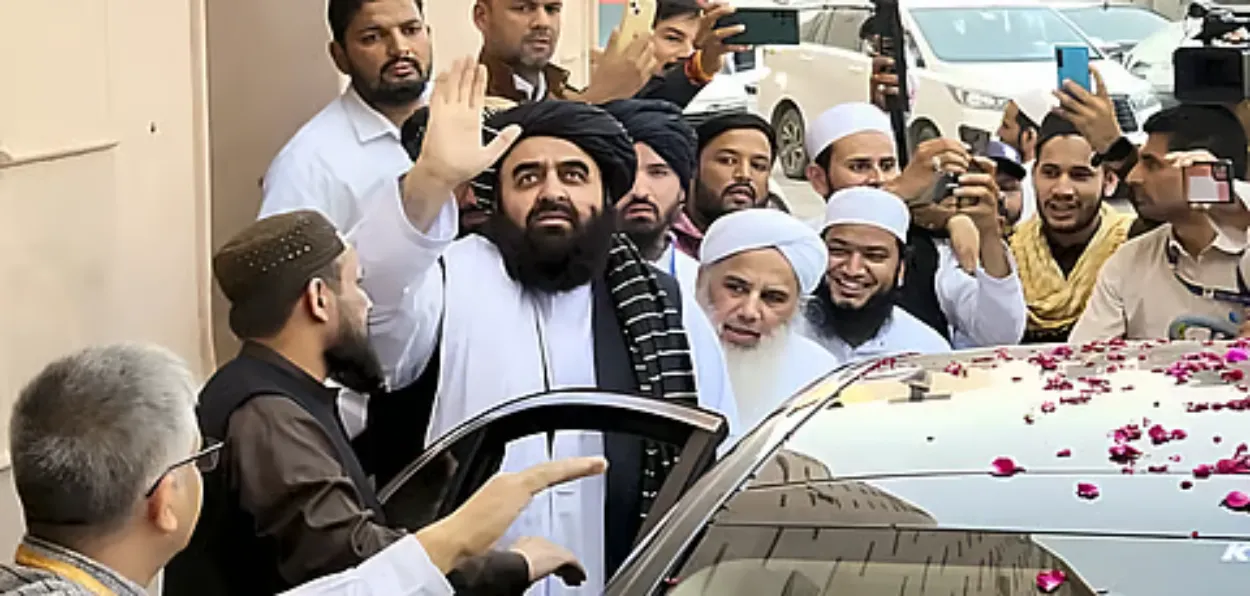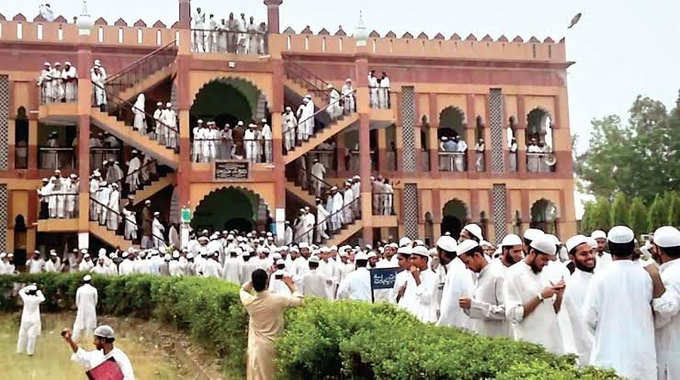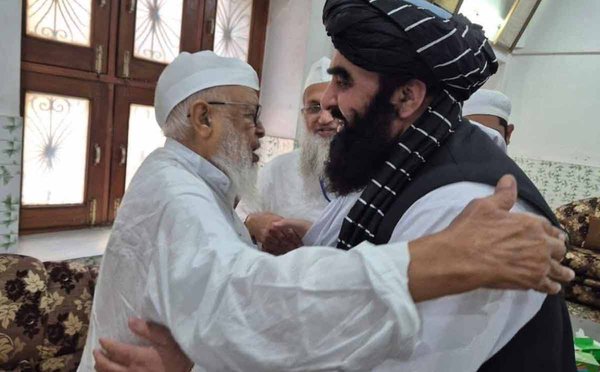
Aditi Bhaduri
One of the highlights of Afghanistan’s foreign minister Mullah Amir Khan Muttaqi's visit to India was his trip to Darul Uloom in Deoband, Asia's largest Islamic seminary, built in 1866. Earlier this year in May in Astana, Kazakhastan, I had the opportunity to meet with Taliban envoy to Kazakhstan. We chatted in Urdu/Hindi. He told me he had a great desire to visit India as one of his dreams was to visit Darul Uloom Deoband. Therefore, Muttaqi's visit was not surprising. Most of the Talibs are graduates of Darul Uloom Haqqania, in Pakistan. They follow the curriculum established in Deoband centuries ago. Hence, their graduates are also followers of Deoband school of Islam.
The crowds that surged in Deoband, and the popularity and respect that the seminary enjoys with the Taliban as well as with many other Afghans highlights Deoband’s potential to become another instrument of India's soft power, and build bridges not only with the Taliban but with many other Muslim countries.
Maulana Qasim Nanotwi, an Islamic scholar, together with Rashid Gangohi, another scholar, built the seminary in 1866 to promote the purest traditions of Islam and preserve Muslim identity. As Muslim rule stumbled in the subcontinent the community went into deep introspection. Across the world, Muslim power was collapsing -- in the Middle East it was the Ottoman Empire, whose ruler the Sultan was Caliph of Muslims worldwide, including those in India, and in the sub-continent it was the Mughal rule.
A strong reason for this defeat was felt to be the adulterated of Islam and Muslims adopting foreign practices.
Darul Uloom Deoband was built with the singular aim of imparting proper religious guidance and education to Muslims. The seminary teaches a very puritanical form of Islam. It doesn’t even mark the birthday of Prophet Mohammed. Only two Eids are celebrated as religious festivals on the campus. At the same time Deoband was a Muslim response to British colonial rule. In that sense Deoband was anti-colonial in nature.

Darul Uloom Deoband campus
In 2010 I visited Darul Uloom Deoband to write a feature on it in the context of 9/11 and the rise of the Taliban, who were schooled the Pakistan’s Deoband school. At that time, 3500 students were enrolled in it. The seminary has produced more than a lakh graduates. Each year sees about 800-1000 students leave the institution and carry its ideology to different corners of India and, sometimes, beyond.
A major contribution the seminary was making to its community was providing free education, boarding, lodging and healthcare to all its students. While the buildings and architecture were marvelous and spread out, living quarters for the students were rather cramped, Everything was free and many of the students came from underprivileged homes from across India. It also had students from Bangladesh, Afghanistan and some other Muslim countries.
The curriculum comprised three segments. The first five years are devoted to basic education, which included the social sciences, Arabic, Hindi, English and Urdu, the medium of instruction.
Islamic jurisprudence is the subject taught for the next seven years, leading to graduation. Students had the option of going for a further two-year specialisation in Islamic jurisprudence or Arabic literature or logic. The alumni worked in places as far as Medina and Manchester.
As Vice-Chancellor Marghubur Rahman was away, his personal assistant Adnan Usmani, explained how Dar-ul-Uloom's curriculum had come to be a model for other seminaries. “Our syllabus is popular and famous and many seminaries in India and abroad follow it. Dar-ul-Uloom Deoband was the first seminary of such scale in South Asia.
"So its syllabus became a model for seminaries that came up later. Initially other seminaries sent their representatives to study here......."Gradually graduates from our seminaries went to different places and established other seminaries or began working in existing ones,'' Usmani had explained then.
The routine was rigorous. The institution, which prohibits coeducation, neither had a women's wing nor a women employees. The day at Dar-ul-Uloom began at 4am with prayers, followed by classes till 10.30am. At noon a gong sounded for lunchtime. After the meal and rest, afternoon prayers were held at 2pm, followed by the second shift of studies. Evening prayers at 5pm were followed by dinner. Prayers were said again at 7pm, and followed by discussions and debates. The last prayers at 9pm brought the day to a close and students retired to their rooms.
There was no provision for students to play games, or music. Watching television was prohibited. But the winds of change had begun blowing in Darul Uloom Deoband too. International scrutiny had the authorities rethink the program, even though Islamic studies curriculum remained intact.
In 2001, a course in English was started. Though students learned English only for two years, the course enabled them to enroll in other institutions after graduation. A computer section was established in 2000. Abdul Rahim, a Deoband graduate himself, was then in charge. The one-year course trained students in desktop publishing, Photoshop, Corel applications, PageMaker and using the internet.
 Afghan Foreign Minister Amir Khan Muttaqi with Maulana Arshad Madni at Darul Uloom
Afghan Foreign Minister Amir Khan Muttaqi with Maulana Arshad Madni at Darul UloomThe war on terror had generated interest in the media. This led to the establishment of a journalism faculty. After completing the seven-year Islamic jurisprudence course, students may study journalism for two years. Thus, students at Deoband are increasingly having more options to pursue a variety of careers, rather than becoming mostly clergy.
Interestingly, John Butt , an Afghanistan-based journalist who had been a student in the 1980s in Deoband wrote after Muttaqi's visit: "There needs to be career options for madrasa graduates. These options—academic and professional—exist in India. One advantage of closer ties between Afghanistan and India will be for such options to permeate through to Afghanistan as well. This will have several advantages. Madrasa graduates will have lucrative incomes in a range of fields.”
This is a lesson that Afghanistan can import from India. Afghan students don't necessarily have to come to Deoband to study. Madrassahs in Afghanistan, especially now that the Taliban with their Deobandi schooling are in power, can import this system of education.
Deoband's utility, however, can go far beyond. While madrassahs beyond India's borders like the Haqqania in Pakistan have adopted Deoband's curriculum, they became infamous as jihadi factories. Unlike them, Deoband, with all its strictness shines bright, removed not just terrorism but even from politics, a decision that it consciously made, even before independence. In the run up to independence, Darul Uloom Deoband strongly championed against partition.
Much later, when the issue of terrorism took centre stage, the seminary in 2008, came out with a fatwa against terrorism, stating: “In Islam, creating social discord or disorder, breach of peace, rioting, bloodshed, pillage or plunder and killing of innocent persons anywhere in the world are all considered most inhuman crimes."
The edict was signed by all clerics present at the conference, which, according to media estimates, numbered about 60,000.
The authority that the Dar-ul-Uloom commands has meant that its opinion is held in high esteem. The seminary's opinion has been sought by institutions and individuals on issues ranging from cow slaughter to the validity of triple talaq (verbal instant divorce) to whether men and women can pray together in a mosque. So numerous are the queries pouring in that a separate department has been set up to look into such aspects.
Here Deoband can play, if it wishes, an important and progressive role to play. The significance of Deoband to the leaders of the Taliban is obvious. Many analysts have opined that Deoband can help decouple the Taliban theologically from Pakistan. Certainly, If India continues to build ties with the Taliban then more leaders may visit India. Deoband's edicts would matter to them. For instance, delinking politics and jihad from madrassahs, which has become the norm in Pakistani, where the Taliban were nurtured, would be a valuable lesson that Deoband can impart to the Taliban and to Afghanistan.
ALSO READ: Diwali lights have a universal appeal, and symbolism
Deoband represents a brand of Indian Islam. By aligning themselves with Deoband, the Taliban can help bring India and Afghanistan closer even within a theological framework. With the authority Deoband commands its edicts would carry weight and be respected by the Taliban. Progressive edicts will enable Dar-ul-Uloom Deoband to bring much needed change to Afghanistan while also establishing itself not just as the largest Islamic seminary in Asia, but one that plays a progressive role in societies.
